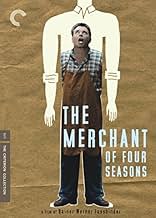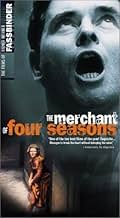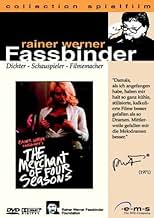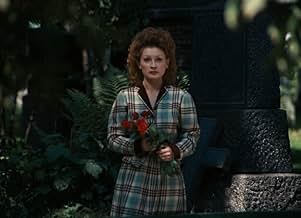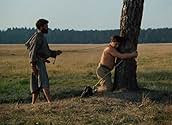El comerciante de las cuatro estaciones
Título original: Händler der vier Jahreszeiten
CALIFICACIÓN DE IMDb
7.3/10
5.5 k
TU CALIFICACIÓN
Hans Epp, un hombre con tendencias autodestructivas, busca significado a la vida vendiendo fruta sin conseguirlo, y su desafección se convierte en desesperación.Hans Epp, un hombre con tendencias autodestructivas, busca significado a la vida vendiendo fruta sin conseguirlo, y su desafección se convierte en desesperación.Hans Epp, un hombre con tendencias autodestructivas, busca significado a la vida vendiendo fruta sin conseguirlo, y su desafección se convierte en desesperación.
- Dirección
- Guionista
- Elenco
- Premios
- 3 premios ganados y 5 nominaciones en total
Walter Sedlmayr
- Fruit cart salesman
- (as Walther Sedlmayer)
El Hedi ben Salem
- The Arab
- (as Salem El Heïdi)
- Dirección
- Guionista
- Todo el elenco y el equipo
- Producción, taquilla y más en IMDbPro
Opiniones destacadas
The Merchant of Four Seasons isn't what I would call a happy movie, at all, or even one that impressed me to the point of praising it to the sky (there are other Fassbinder flicks for that, like Veronika Voss and the underrated Satan's Brew). But it's certainly no less than a fascinating experiment in taking a look at those in a society that you and me and others we know might possibly know, or not really want to know. I imagine in the early 70s in Germany a generation, coming out of WW2, had a stigma to live with but tried their best just to get by. This is a stigma that floats all over this film, and in many instances in Fassbinder's work in general, but especially because with Four Seasons he takes his eye on the middle class, and a particular married couple- the distanced, depressed, angry Hans the fruit seller and his long-suffered wife- that is nothing short than trying for realism in the guise of melodrama. If Cassavetes were a crazy German he might make this film, maybe even as just a lark.
The story sounds simple enough, where Hans' drinking gets out of control, he beats his wife (this scene is one of the toughest to take, maybe in just any movie, the way Fassbinder's camera lingers without a cut as his wife is left helpless and their daughter trying to stop him in his frenzy) and then she's ready to leave him. As he stands in the room, her family holding him back, she makes the call for divorce and he gets a heart attack right there. He recovers, his business suddenly starts booming again with some help from some good (or not so good) employees - and yet this only continues his longing, for another woman, and his despair in general.
And yet it's in this simplicity that Fassbinder tries, and succeeds for the most part, in attaining a mood of dread, of a tense vibe in a kitchen or in the bedroom or out on the street that you can cut with a knife and bleed out. The weakest part of this all may be the acting... at least that was my initial impression. Hans, played by Hirschmuller, can be a stilted presence, with only the slightest movements in his face and eyes, and for a while it doesn't look like he's much of a good actor. The actress playing his wife, Irm Hermann, and her sister (Fassbinder Hanna Schygulla) fare better, but only cause they're given more to do conventionally, like cry or look concerned. It takes some time to adjust to what is, essentially, a void in his guy Hans, of something from his own psychological self-torment or self-pity that pervades himself and those around him who just want to get on with some sense of normalcy, especially once Hans gets successful.
Not everything clicks together in The Merchant of Four Seasons, but enough did to make me recommend it to those looking for a different slice-of-life than you might be used to with more modern American movies. Fassbinder's world here is a combat between the melodrama he loves in cinema and the harsh, crushing sense of humanism that he feels personally and puts into characters that, for better or worse, we somehow identify with. Are the Epps a family you know of? Or could you even be them? Who's to say. It's a methodical study of tragic emptiness in the human spirit, and its goals are all attained.
The story sounds simple enough, where Hans' drinking gets out of control, he beats his wife (this scene is one of the toughest to take, maybe in just any movie, the way Fassbinder's camera lingers without a cut as his wife is left helpless and their daughter trying to stop him in his frenzy) and then she's ready to leave him. As he stands in the room, her family holding him back, she makes the call for divorce and he gets a heart attack right there. He recovers, his business suddenly starts booming again with some help from some good (or not so good) employees - and yet this only continues his longing, for another woman, and his despair in general.
And yet it's in this simplicity that Fassbinder tries, and succeeds for the most part, in attaining a mood of dread, of a tense vibe in a kitchen or in the bedroom or out on the street that you can cut with a knife and bleed out. The weakest part of this all may be the acting... at least that was my initial impression. Hans, played by Hirschmuller, can be a stilted presence, with only the slightest movements in his face and eyes, and for a while it doesn't look like he's much of a good actor. The actress playing his wife, Irm Hermann, and her sister (Fassbinder Hanna Schygulla) fare better, but only cause they're given more to do conventionally, like cry or look concerned. It takes some time to adjust to what is, essentially, a void in his guy Hans, of something from his own psychological self-torment or self-pity that pervades himself and those around him who just want to get on with some sense of normalcy, especially once Hans gets successful.
Not everything clicks together in The Merchant of Four Seasons, but enough did to make me recommend it to those looking for a different slice-of-life than you might be used to with more modern American movies. Fassbinder's world here is a combat between the melodrama he loves in cinema and the harsh, crushing sense of humanism that he feels personally and puts into characters that, for better or worse, we somehow identify with. Are the Epps a family you know of? Or could you even be them? Who's to say. It's a methodical study of tragic emptiness in the human spirit, and its goals are all attained.
What kind I say about this movie. well for starters, I thought that this film was okay, not the greatest not worst. I said this cause I thought that the script was great and original, really different and refreshing. Now I wouldn't say that it's the greatest film that I've seeing cause of the acting. The actors that played each role, seems that they played them without emotions, as if they took the life out of them. When the wife laughed or cried, this didn't look real to me for some reason, that's just an example, but sincerely all the characters didn't act real at all. I wish I could say more positive things about this film so you guys can see it at least once but how can I do that since I know that I'm not going to see this movie again. I rented this film from the library of my school, without hearing anything about the film itself or the director. I took a chance because the story that was describe on the back sounded really interesting and it really was.
I rented the movie at the local library, since I had years earlier seen Angst Essen Die Seele Auf, and liked it. It started very interesting with Hans Epp returning from a spell with the Foreign Legion, but the first thing his mother told him was how he was a failure and always would be. "Was ist traurig VorMittag ist noch traurig NachMittag" But I found the actors in this movie to be like zombies. It might be that they just depicted a dreary every day life, but I felt midways into the film that I don`t need to have these pictures inside my head, so I pressed the stop button and in stead put on the other film I had rented at the library, an episode of Star Trek Voyager.
Not that this is a bad movie, it was just tragic to watch at the time.
Not that this is a bad movie, it was just tragic to watch at the time.
If I squint, I can see the influence of Douglas Sirk on this Rainer Werner Fassbinder soaper about fruitseller Hans Hirschmüller. He's cast as a failure, because he doesn't live up to the middle-class aspirations of his family. He runs away and joins the Foreign Legion. He returns and joins the police, but is kicked out for consorting with a prostitute. His one true love can't marry him because of his work, although she meets him for assignations. In between, he has a shrewish wife in Irm Hermann, in-laws who despise him, a heart attack, and his gradual erasure from his own life to contend with.
However, while Sirk's most famous work in the 1950s tinges his disapproval of the post-war middle class with sympathy and wonderment at peoples' refusal to admit what they want to to be happy, Fassbinder seems angry and contemptuous of his subjects. Hirschmüller is too passive, Miss Miss Hermann plays the victim card too aggressively, his family arrant, mealy-mouthed snobs, and so forth. There's no one to root for in this. There's nothing tragic about his inevitable destruction, only a sadistic, scolding examination of all that Fassbinder finds wrong with mainstream society.
However, while Sirk's most famous work in the 1950s tinges his disapproval of the post-war middle class with sympathy and wonderment at peoples' refusal to admit what they want to to be happy, Fassbinder seems angry and contemptuous of his subjects. Hirschmüller is too passive, Miss Miss Hermann plays the victim card too aggressively, his family arrant, mealy-mouthed snobs, and so forth. There's no one to root for in this. There's nothing tragic about his inevitable destruction, only a sadistic, scolding examination of all that Fassbinder finds wrong with mainstream society.
About a man who lives life in a permanent crisis, don't we all these days - captured through portraits and pictures that could stand by themselves in any art gallery. A work of genius by a genius.
¿Sabías que…?
- TriviaAndrea Schober's debut.
- ConexionesFeatured in Sehnsucht nach Sodom (1989)
Selecciones populares
Inicia sesión para calificar y agrega a la lista de videos para obtener recomendaciones personalizadas
- How long is The Merchant of Four Seasons?Con tecnología de Alexa
Detalles
Taquilla
- Presupuesto
- DEM 325,000 (estimado)
- Total en EE. UU. y Canadá
- USD 8,144
- Fin de semana de estreno en EE. UU. y Canadá
- USD 11,623
- 16 feb 2003
- Total a nivel mundial
- USD 8,158
Contribuir a esta página
Sugiere una edición o agrega el contenido que falta



